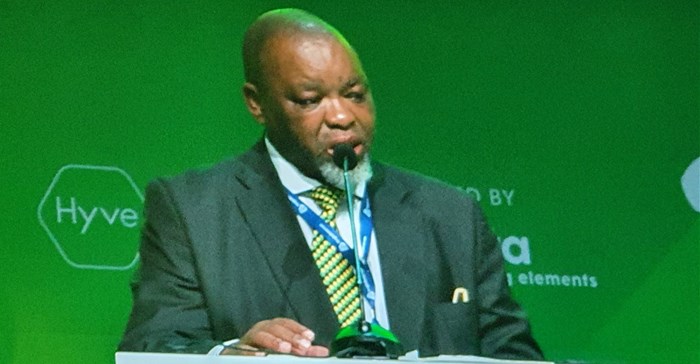
Top stories






More news














According to the International Monetary Fund (IMF), South Africa’s GDP growth prospects for 2020 will be just under 1%. "Contributing factors to this outlook are said to be structural constraints and recent power outages. The latest data released by Statistics SA show that mining production decreased by 3.1% year-on-year in November 2019. The largest contributors to the decline in production were platinum group metals (PGMs), coal, and iron ore. On the positive side, however, “non-metallic” minerals made significant positive contribution to production," he said.
"It is imperative that the mining industry positions itself to take the opportunities of the new global economic landscape as the demand grows for commodities that will lead the 4th Industrial Revolution."
— Department of Mineral Resources and Energy (@DMR_SA) February 3, 2020
Minister Mantashe. #4IR #InvestinSAmining #MiningIndaba2020 pic.twitter.com/4mp60BR7zK
"South African mining has great benefits for investors and South Africans across the value chain. In 2019, in response to the President’s R1tn Investment Drive, the Department granted 28 new mining rights in coal; iron ore; manganese. Estimates are that; a potential of 4,800 jobs will be created from these and there will be a billion rands capital expenditure. We must work together to convert these rights into active projects that can deliver the much-needed revenue and jobs."
South African mining has great benefits for investors and South Africans across the value chain, remarked the Minister, #MiningIndaba2020 @Energy_ZA @DMR_SA @ GwedeMantashe1
— Department of Mineral Resources and Energy (@Energy_ZA) February 3, 2020
Mantashe said in light of the Eskom crisis and until "we go back to the comfortable day of surplus electricity", mines had been given the go-ahead to generate their own power.
Self generation will be part of our make-up of energy supply to take the pressure off from Eskom. Self generation for own use will be allowed. All that is needed to be done is to register. However, generation to sell is business. This would require licensing. #MiningIndaba2020 pic.twitter.com/i8QK1wMYoz
— Gwede Mantashe (@GwedeMantashe1) February 2, 2020
The minister said that transforming of the economy and creating jobs is one of the seven apex priorities declared by President Cyril Ramaphosa. Policy and regulatory certainty are key to attracting investments.
"To this end, we remain committed and continue to work with the investor community on improving our regulatory framework to provide such certainty. We have found the more we engage with industry, the better the regulation.
"We have advanced with the separation of the upstream legislative provisions for oil and gas from traditional minerals. In December 2019, we gazetted the draft Upstream Petroleum Development Bill for public comments. Since then, we have been receiving positive comments on the Bill and this is a signal to us that we are on the right path," Mantashe said.
Mining companies must take seriously the communities on whose land they mine, he said.
Industry must see communities as partners not enemies. Inclusion must be prioritized, said the Minister Mantashe. @Energy_ZA @DMR_SA @ GwedeMantashe1 pic.twitter.com/YQc1UAJ6JY
— Department of Mineral Resources and Energy (@Energy_ZA) February 3, 2020
